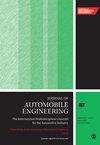履带式车辆机械-电气-液压再生悬挂系统的能量回收和乘坐舒适性分析
IF 1.5
4区 工程技术
Q3 ENGINEERING, MECHANICAL
Proceedings of the Institution of Mechanical Engineers Part D-Journal of Automobile Engineering
Pub Date : 2024-07-26
DOI:10.1177/09544070241265034
引用次数: 0
摘要
本文提出了一种适用于履带式车辆的新型机电液再生悬架系统(MEH-RSS),在有效回收悬架振动能量、提高悬架工作可靠性的同时,改善了履带式车辆的乘坐舒适性。建立了考虑 MEH-RSS 动态阻尼系数的动力学模型,并对履带车辆的乘坐舒适性进行了分析,以验证 MEH-RSS 的减振性能。基于双向能量管理控制策略,设计了能量回收模块的仿真试验,结果表明 MEH-RSS 可实现半主动阻尼力调节功能和高效的能量回收。单转向架车轮 2-DOF 模型的仿真结果表明,MEH-RSS 的阻尼系数能够适应路面激励特性的变化,并可通过调节外阻力实现半主动控制功能。在行驶速度为 10 m/s 的 E 级越野路面上,平均能量回收功率可达 4442 W。半车 8-DOF 模型模拟结果表明,在被动工况下,配备 MEH-RSS 的履带式车辆在 E 级越野路面上的垂直加速度均方根值比配备传统被动悬架(TPS)的履带式车辆降低了 5.7%。MEH-RSS 可有效改善履带式车辆的乘坐舒适性,同时实现振动能量回收。本文章由计算机程序翻译,如有差异,请以英文原文为准。
Energy recovery and ride comfort analysis of mechanical-electrical-hydraulic regenerative suspension system for tracked vehicle
A novel mechanical-electrical-hydraulic regenerative suspension system (MEH-RSS) suitable for tracked vehicles is proposed to improve the ride comfort of tracked vehicles while efficiently recovering the suspension vibration energy and improving the suspension working reliability. The dynamical model considering the dynamic damping coefficient of the MEH-RSS is established and the ride comfort analysis of tracked vehicle is carried out to verify the vibration reduction performance of the MEH-RSS. A simulated test of the energy recovery module is designed based on the bidirectional energy management control strategy, and the results show that the MEH-RSS can achieve semi-active damping force adjustment function and efficient energy recovery. The simulation results of a single bogie wheel 2-DOF model show that the damping coefficient of the MEH-RSS can adapt to the changes in road excitation characteristics, and semi-active control function can be achieved by adjusting the external resistance. The average energy recovery power of 4442 W can be reached on E-class off-road with a driving velocity of 10 m/s. The half vehicle 8-DOF model simulation results show that under passive working conditions, the root-mean-square (RMS) value of the vertical acceleration of a tracked vehicle equipped with MEH-RSS is reduced by 5.7% relative to that of a tracked vehicle equipped with traditional passive suspension (TPS) on E-class off-road. The MEH-RSS can effectively improve the ride comfort of tracked vehicles while achieving vibration energy recovery.
求助全文
通过发布文献求助,成功后即可免费获取论文全文。
去求助
来源期刊

CiteScore
4.40
自引率
17.60%
发文量
263
审稿时长
3.5 months
期刊介绍:
The Journal of Automobile Engineering is an established, high quality multi-disciplinary journal which publishes the very best peer-reviewed science and engineering in the field.
 求助内容:
求助内容: 应助结果提醒方式:
应助结果提醒方式:


